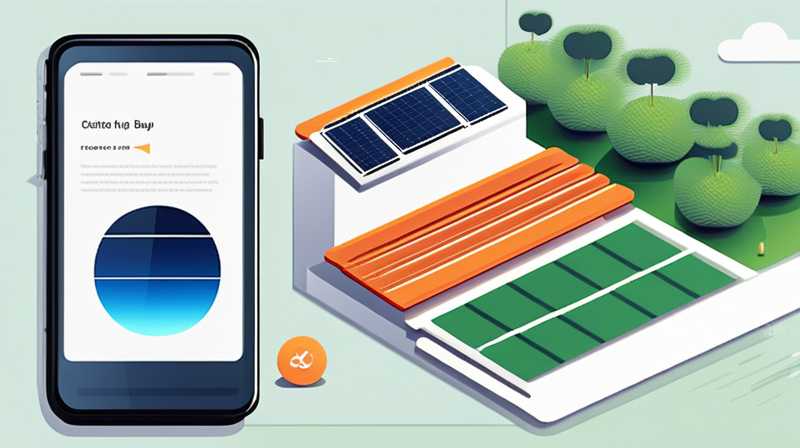
To make informed decisions when purchasing solar panels, several critical factors should be examined. 1. Understand your energy needs, 2. Assess the available space and installation requirements, 3. Identify reputable manufacturers and product specifications, 4. Evaluate financial options and incentives. By comprehensively evaluating your energy consumption, you can tailor the solar system to meet your specific requirements. Understanding your energy needs involves analyzing your electricity bills and identifying peak usage hours, which helps to determine the appropriate system size and capacity needed to optimize energy production.
1. UNDERSTANDING ENERGY NEEDS
The Importance of Energy Needs Assessment
Before proceeding with the acquisition of solar panels, one must conduct a thorough assessment of personal energy consumption patterns. This involves a meticulous examination of electricity bills over the preceding year to grasp the average monthly usage, peak demand, and any seasonal fluctuations. Understanding these patterns forms the foundation for determining the size of the solar panel system required.
Analyzing Your Electricity Consumption
It is vital to consider not just the total kilowatt-hours used but also the times when energy consumption peaks. For example, if electricity usage is highest during the daytime when solar production peaks, a grid-tied system may be ideal. However, if energy needs ramp up in the evening, one needs to evaluate options that might include battery storage solutions, which can store excess energy produced during sunny periods.
2. ASSESSING SPACE AND INSTALLATION REQUIREMENTS
Evaluating Suitable Locations
The physical space available for solar panel installation plays a crucial role in the selection process. Potential solar setups can vary from rooftop installations to ground-mounted systems. Before committing, it would be prudent to consider the orientation, tilt, and shading of the installation site. Optimal conditions include south-facing roofs with minimal obstructions for maximum sunlight exposure.
Understanding Installation Considerations
Various installation methods can affect both performance and costs. Potential buyers should also explore factors such as roof condition and local building regulations that might influence installation viability. Additionally, considering accessibility for maintenance purposes is paramount to ensure longevity and efficiency of the solar installation.
3. IDENTIFYING REPUTABLE MANUFACTURERS AND PRODUCT SPECIFICATIONS
Researching Solar Panel Brands
Once you have sorted out personal energy needs and the physical aspects of installation, the next step involves researching solar panel manufacturers. Industry reputation often reflects product reliability, durability, and efficiency. Leading brands typically provide detailed specifications, including power output ratings, efficiency rates, and warranties. Product warranties may extend from 10 to 25 years, and these provide assurance regarding long-term performance.
Discerning Product Specifications
Beyond brand reputation, understanding technical specifications is essential. Performance metrics such as efficiency indicate how effectively a panel converts sunlight into usable electricity. Furthermore, one should pay attention to temperature coefficient ratings which inform potential efficiency losses in hotter climates.
4. EVALUATING FINANCIAL OPTIONS AND INCENTIVES
Understanding Financial Implications
Financing options can vary widely depending on individual circumstances, with possibilities ranging from outright purchases to financing loans or leases. Potential buyers must evaluate which method aligns with their financial goals, taking into consideration upfront costs versus long-term savings. Various state and federal incentives such as tax credits or rebates can drastically reduce initial expenditures on solar panels.
Exploring Incentives and Rebates
In addition to state-level incentives, many utility companies offer rebates to encourage solar adoption. An in-depth investigation of these initiatives can significantly enhance a buyer’s understanding of the financial landscape. Additionally, exploring financing options that offer no upfront costs can make solar more accessible, promoting a rapid return on investment while reducing monthly electricity costs.
FAQS
WHAT ARE THE DIFFERENT TYPES OF SOLAR PANELS AVAILABLE?
There are primarily three types of solar panels: monocrystalline, polycrystalline, and thin-film. Monocrystalline panels are made from a single crystal structure and usually offer higher efficiency and aesthetic appeal. They excel in areas with limited space as they require fewer panels to produce the same amount of energy as alternatives. Polycrystalline panels consist of multiple crystal structures and are typically more affordable, although they may come with slightly lower efficiency rates. Thin-film panels, on the other hand, are lightweight and flexible but often require more space to achieve similar outputs, making them less popular for residential installations.
HOW DOES SOLAR PANEL INSTALLATION AFFECT PROPERTY VALUE?
Installing solar panels typically increases property value significantly. Homes equipped with solar energy systems demonstrate lower utility costs, often appealing to potential buyers. Real estate studies show that homes with solar installations can sell for up to 20% more than their non-solar counterparts. Notably, the exact increase in property value can vary based on regional solar incentives and real estate market conditions. This enhanced value not only facilitates a better selling price but can also reduce the time a home spends on the market.
ARE THERE ANY MAINTENANCE REQUIREMENTS FOR SOLAR PANELS?
Solar panels generally require minimal maintenance due to their robust design. However, regular inspections are essential to ensure cleanliness and check for damage. Environmental dirt, debris, or bird droppings can accumulate on the panels, which may reduce their efficiency. Cleaning can typically be accomplished with a simple rinse from a garden hose, especially after rain. Additionally, it is advisable to have annual professional inspections to guarantee that every component of the solar system, including inverters and wiring, is functioning optimally.
In summary, purchasing solar panels is a multifaceted decision that demands careful consideration and thorough research. By evaluating personal energy needs, assessing installation space, investigating reputable manufacturers, and understanding available financial options, buyers can make informed choices. With the right approach, solar energy can not only lower utility costs but also contribute to environmental sustainability. Anyone considering solar panels is encouraged to begin by meticulously examining their individual circumstances, keeping in mind that each step, from planning to installation, has a significant impact on ultimate satisfaction with their solar investment. The journey to harnessing solar energy effectively can prove rewarding on multiple fronts, from financial savings to promoting a cleaner and greener future.
Original article by NenPower, If reposted, please credit the source: https://nenpower.com/blog/how-to-buy-solar-panels-correctly/


